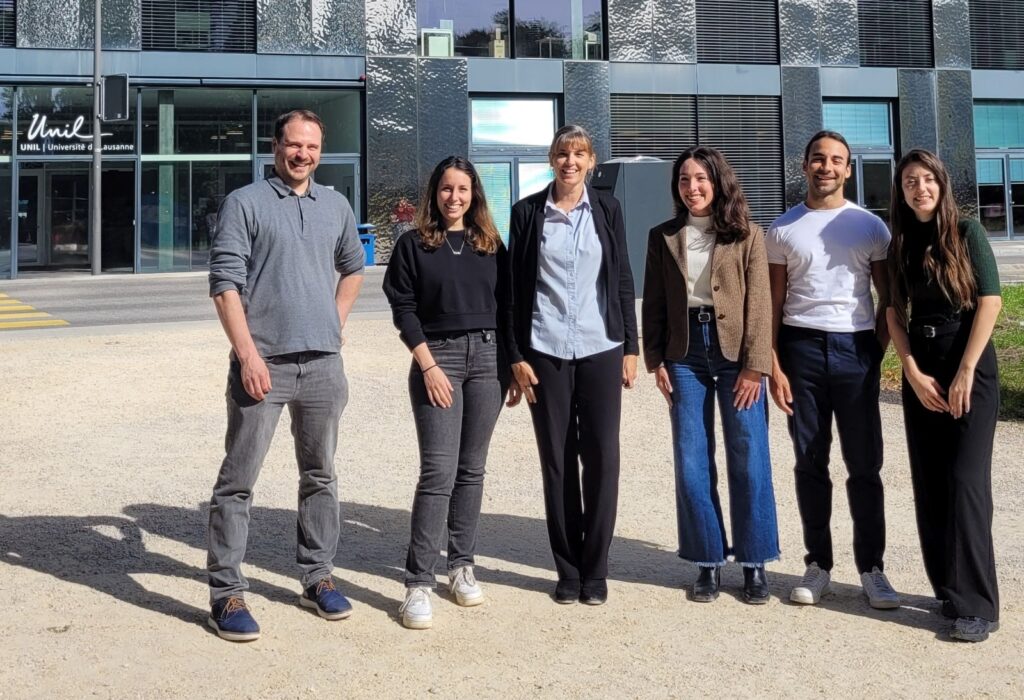
Current lab members:
Elise Dan-Glauser, PhD
Group Leader, Associate Professor

With an Eccellenza fellowship from the SNF (2020-2025), we are aiming at better understanding how personality is related to emotion emergence through appraisal processes and what are the determinants of emotion regulation efficiency.
With a Project Funding from the SNF (2023-2026), we are also investigating how beliefs in emotion regulation (both implicit and explicit) may impact the link between emotional competence and emotion emergence / emotion regulation abilities.
My other interests go toward examining the effects of simultaneous use of several emotion regulation strategies, other individual differences pertaining adapted emotion processes (empathy, self-esteem, creativity), as well as how differenciated appraisal processes lead to different emotions.
Contact: elise.danglauser@unil.ch
Phone: +41 (0)21 6926273
Office: 4138
________________________________
Hippolyte Fournier
Post-doctoral fellow

My research explores how social media shapes our brain, cognition, and emotional responses. It begins by examining the disruptive effects of notifications, and why some individuals are more vulnerable to such disruption than others, drawing on cognitive models of emotion and reward-seeking models. By combining behavioral tasks with physiological measures, this work seeks to uncover the mechanisms through which everyday digital signals influence our concentration and self-regulation.
Contact: hippolyte.fournier@unil.ch
________________________________
Livia Sacchi
PhD Student

In my thesis, I address the link between personality, specific appraisals, and emotional response patterns at the experiential, expressive, and physiological levels. It was suggested that changes in the nature of the felt emotion necessitate changes in appraisal processes. It was also demonstrated that personality can be seen as a predisposition to feel more frequently certain emotions. We could thus assume that personality traits influence certain appraisals, which in turn influence the consecutive emotional reactions. In my research, I thus aim at comprehensively addressing the routes that goes from personality to emotional reactions through appraisal processes. Elucidating these relationships will deepen our understanding of emotional reactivity differences between individuals.
Contact: livia.sacchi@unil.ch
________________________________
Elena Trentini
PhD Student

Emotions are very frequent in everyday life and drive our behaviour and adaptation. Both the society and the individual needs urge people to modulate these emotions, this is called emotion regulation. In my thesis, I address the efficiency of emotion regulation strategies. By examining the variation of emotional response patterns at the experiential, expressive, and physiological levels when people are regulating, we can rapidly identify in individuals which emotion regulation strategy is efficient and which one is not. Past studies have, by such means, categorized strategies as either efficient or not efficient, but without taking into account the personality of the one performing this regulation. We thus assume that personality traits influence the ressources that are mobilized to regulate emotions and that certain emotion regulation strategies may be more efficient for certain personalities. Elucidating these relationships will deepen our understanding of why some emotion regulation may appear efficient for some individuals but not for others.
Contact: elena.trentini@unil.ch
________________________________
Sofia Batziou
PhD Student

Emotions are a potent source of information that can signal if a situation is beneficial for the psychological and physical self, or if an adjustment is required. The emotion regulation (ER) process, through which one increases, maintains or diminishes the strength and the duration of an emotion, allows an adaptation to internal and external demands. Throughout this process, a variety of factors can influence which strategy will be chosen, as well as how effective the selected strategy will be. The goal of my thesis is to investigate if personality can be identified as one of these factors. In particular, I aim at understanding if and which personality characteristics are related to a preference for specific ER strategies, and thus to a more frequent use and to an enhanced effectiveness of these strategies. This will refine our knowledge on why some individuals chose ER strategies beyond their (non-)adaptive nature.
Contact: sofia.batziou@unil.ch
________________________________
Yasmine Capela
PhD Student

Through my scientific contributions, I hope to shed light on underexplored areas in the field of psychology. Emotions are an enormous part of our daily lives, guiding, controlling, and nourishing our behaviors, reflections, and decisions. I am particularly drawn to exploring the psychophysiological aspects of emotion, as this approach offers greater objectivity and validity.
Contact: yasmine.capelaabdalla@unil.ch
________________________________
Susanne Cambi
Research Assistant

My interests include affective research and its applications for psychopathology or chronic illnesses.After a first research experience in neuroscience in the field of eating disorders, I am now delving into affective psychology research, with a focus on emotion regulation (ER).
I am conducting a study investigating differences in the efficiency of chosen ER strategies, where the choice of strategies is adapted based on participants’ personality type. This should help us further characterize the importance of considering personality when suggesting a specific ER strategy.
Contact: Susanne.Cambi@unil.ch
________________________________
Marianne Gabastou
Research Assistant

Affective Sciences is a field of research I’m particularly fond of. During my university studies, I had the opportunity to take part in scientific projects in the fields of Neuroscience, Psychology of Emotions and Psychophysiology.
Recently admitted to Professor Dan-Glauser’s research team, I am currently working on two research projects linked to emotional regulation. The first involves identifying a potential mediating effect of belief in the value of emotional regulation on the relationship between emotional competence and emotional processes. The second aims to determine whether personality types have an impact on the emotional regulation strategies employed and their effectiveness.
Contact: Marianne.Gabastou@unil.ch
Alumni:
Francesco Ruinato
Research Assistant 2021-2024
I am interested in the characterization of affective processes, with a particular emphasis on the influence of context. My primary focus is on the various kinds of emotions that individuals experience, and how they are influenced in different real-life settings. In my research, I aim to uncover the particular emotions arising in the driving context, with the aim of understanding road rage and road anxiety emergence. My research seeks to identify the specific situations that contribute to these negative experiences and to explore how they can be better managed.
________________________________
Marcel Meyer
Post-doctoral fellow 2023-2024
Principally, my research is centred on two key areas, emotion regulation and cognitive control of emotion. After my PhD at Cardiff University I further enriched my research portfolio on these two themes, with postdoctoral placements across Switzerland and Germany. Here, in Lausanne we established a new line of investigation, aiming to elucidate the diverse interplay between emotional competence, emotion regulation beliefs and emotion regulation-linked behaviours.
________________________________
Julia Kolly
Student Research Assistant 2020-2021
My activity in the lab dealt with a project examining to what extent creativity, and in particular divergent creativity, can be related to the use of different emotion regulation strategies. More specifically, we were interested in the use of cognitive reappraisal and how its use is impeded or facilitated by individual differences in creative abilities.
________________________________
Simon Thuillard
Research Assistant, 2016-2018
Besides working on the affective consequences of Situation selection, I am particularly interested on humor appreciation and the role of appraisal in finding a stimuli funny or not. I would like to test several types of humorous stimuli corresponding to different kind of humor theories: the incongruity theory, corresponding to a cognitive point of view, and the superiority theory, corresponding to a more social point of view. Using psychophysiological measures, I would also like to assess the possible usefulness of humor as an emotion regulation strategy.
________________________________
Marianne Richter
Student Research Assistant, 2017
With Elise Dan-Glauser, I worked on two projects investigating appraisal processes and emotional responses in real life situations. We investigated the complex relationship there is between personality and significant past experience, and the appraisal of daily emotional situations and their emotional consequences (responses).
